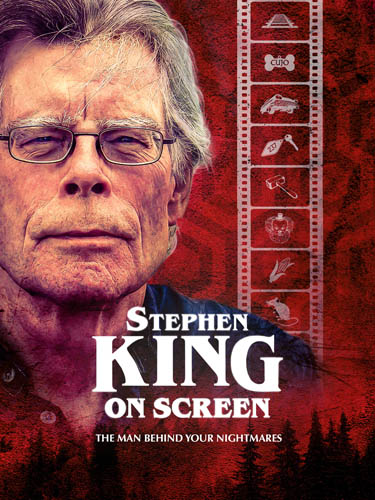Stephen King On Screen (2023)
Directed by: Daphné Baiwir

STEPHEN KING ON SCREEN
Directed by Daphné Baiwir
Available on digital and Blu-Ray
A couple of years ago I realised I’d read quite a lot of Stephen King, so decided I’d try and check out everything he’s written – around 65 novels, several novella volumes and hundreds of shorts. At time of writing, I’m 48 books and numerous stories in, and I have seen many adaptations as I’ve gone on. As such, Daphné Baiwir’s documentary Stephen King On Screen sounded like just the ticket – at least on paper. What’s a better way to pass 100 minutes than hanging with Frank Darabont, Mike Flanagan, Tom Holland (the horror one), Mick Garris, and the late James Caan, among many others, to celebrate Sai King?
Bairwir has a clear passion for her subject, and judging by the intro scene, which has more Easter eggs than April in your local Tesco, an encyclopedic knowledge of all things King. However, after a promising prologue, I found the lack of structure frustrating. It starts simply enough, with her talking heads warmly recounting their earliest exposure to King on the page or screen. As a constant reader myself, I was happy to hear them recount late-night viewings of the It miniseries or how Carrie spoke to them. There’s also some good commentary on what makes King so special: he was among the first horror writers to situate horror in a recognisable world with authentic, everyday characters. Where others had thrust odd characters into fantastical situations, he cut straight to the dark heart of America. But from there, it branches out to cover particular movies – giving it a narrative ebb and flow.
This wouldn’t be a problem if it were thematically richer, but Stephen King On Screen watches like several short making-of documentaries for much of its running time. The ones it focuses on also tend to be the usual suspects, with anecdotes many fans will have heard before. For instance, we all know King and Kubrick didn’t see eye-to-eye and that The Mist had a different ending. Speaking of The Mist, it’s great to hear from Frank Darabont – frankly, I could listen to him speak for hours. Still, the separate sections on The Mist, The Shawshank Redemption, and The Green Mile begin to drag, especially considering how many King movies have been made.
To an extent, this was inevitable – some of these movies are all-time classics, and part of the appeal of having big names on is having them talk about their stuff. Still, like attending a concert by a band you love you don’t just want to hear the hits, and King has contributed so much to cinema. In particular, I’d like to have seen more about smaller, less successful films, their many sequels, how a 2000-word piece for Playboy becomes a feature, or his famous dollar babies. We get some footage from Storm Of The Century and Rose Red, but they are brushed over quite quickly. Whereas were the documentary organised by particular sections, like monsters, settings, supernatural powers, etc then there would be scope to give give other relatively minor works a shout.
However, plaudits to Baiwir for not only talking about his horror outputs. Instead, the picture that emerges is of a great American author who happens to dabble in the macabre. As she is happy to remind us, for every Shining there’s a Stand By Me. But despite all the talk about King’s range, seeing no women talking about how well he writes female characters was jarring. To be fair, he often does. Delores Claiborne, Lisey’s Story and Gerald’s Game are good examples, as are Firestarter and Carrie. However, this uncritical perspective omits his numerous problems with casual objectification (count the amount of times he discusses their size of the breasts and thighs compared to men’s chests or balls) and making them passively suffer for narrative convenience. The rose-tinted approach is even more blatant when discussing how well King handles race.
There’s much to be said about the importance of representation, and I am obviously not trying to cancel him – especially not for work from decades ago. Yet typically, his ethnic minority characters are limited to side roles, and he has a bad record of embracing problematic racial stereotypes in his books and by extension films. Most often this takes the form of the Magical Negro trope, in The Green Mile, The Shining, and The Stand, among others. Still, arguably Thinner and Pet Sematary have elements too – the less said about the currently adaptation-free Dedication, the better. As a man in his mid-70s, it’s obviously good that he’s changed with the times, and I believe he was generally well-meaning. Today his work is more empathetic than before, with a greater interest in the world outside small-town America. Yet there’s the potential for a documentary like this to assess how King’s stories and adaptations have evolved over time. Without this sort of discussion, it’s a fairly shallow, if fun, geek-out.
And this is the key point – issues with how deep it goes notwithstanding, there’s a lot to like here. We have ample experts saying their pieces, cool footage from many, many projects and a loving look at why his books lend themselves so well to cinema. We also get some insights into some of his most iconic characters. This will be enough for many viewers – particularly if they are not seasoned fans and don’t know their Dark Tower from their Dark Half. Nevertheless, I suspect long-term fans or those looking for something that contextualises King against the culture he’s gone on to influence will find it lacking. Still, maybe Baiwir can go the way of Children Of The Corn, Lawnmower Man, Sometimes They Come Back, Salem’s Lot, Creepshow, and The Mangler with a string of unexpected sequels. Like with King himself, I know I’d come back for more.
Stephen King on Screen is available on digital now and on Blu-Ray in the UK from 18th September 2023.





Be the first to comment